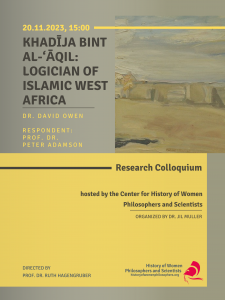 On the 20th of November at 3pm David Owen will give a talk on Khadīja Bint al-‘Āqil: Logician of Islamic West Africa at the Center for the History of Women Philosophers and Scientists. David Owen studies the history of logic in the western Islamicate world. He is especially interested in formal patterns of reasoning in the legal education of big religious traditions, and especially within the cultural continuum of the Bissau-to-Bilbao complex. In Fall 2023, David will defend his dissertation in Arabic & Islamic Studies at Harvard University, where he has also completed the Secondary Field in Classical Philosophy. The dissertation provides the first treatment of the Avicennan logic of a prominent west Saharan luminary, Ghadīja (Khadīja) Mint (Bint) al-‘Āqil (d. ca. 1835).
On the 20th of November at 3pm David Owen will give a talk on Khadīja Bint al-‘Āqil: Logician of Islamic West Africa at the Center for the History of Women Philosophers and Scientists. David Owen studies the history of logic in the western Islamicate world. He is especially interested in formal patterns of reasoning in the legal education of big religious traditions, and especially within the cultural continuum of the Bissau-to-Bilbao complex. In Fall 2023, David will defend his dissertation in Arabic & Islamic Studies at Harvard University, where he has also completed the Secondary Field in Classical Philosophy. The dissertation provides the first treatment of the Avicennan logic of a prominent west Saharan luminary, Ghadīja (Khadīja) Mint (Bint) al-‘Āqil (d. ca. 1835).
See here the abstract of the talk: Ghadīja (Khadīja) Mint (Bint) al-‘Āqil al-Daymānīya (d. ca. 1835) flourished at the end of the 18th and beginning of the 19th century in the southwestern Sahara, in the Gebla region of today’s Mauritania. A brief review of women’s contributions to the history of logic underscores Ghadīja’s historical importance, as one of only two women authors on logic prior to Frege with a complete, extant work on logic. Khadīja’s Ṭurra ‘alā l-Sullam is the best known, and most reliably preserved, textual record of her teaching across the intellectual sciences of the Core Curriculum of Islamic West Africa (Hall and Stewart, 2010). Her Ṭurra, still being glossed and reproduced for study in Mauritania, is a commentary on a 16th century arjūza of Avicennan logic, the Sullam al-murawnaq. The Sullam was composed by the Algerian scholar ‘Abd al-Raḥmān al-Akhḍarī, and is arguably the most widely studied work of Arabic logic in the world today. In this talk, I introduce the audience to what is known about Ghadīja’s life, teaching, and legacy. I compare Ghadīja’s treatment in the sources to that of her brother and student Aḥmad, and unveil a digital archive for Arabic logic texts, with the work of al-Akhḍarī and Ghadīja as its centerpiece. The research results herein show the relevance of gender to, as well as the utility of text-editing, digital archiving, and comparative scholasticism for, the field of Arabic logic.
We are excited to welcome Prof. Dr. Peter Adamson as respondent for David Owen’s talk. Peter Adamson’s primary areas of interest are late ancient philosophy and Arabic philosophy. His two monographs deal with the Arabic version of Plotinus, the so-called “Theology of Aristotle,” and with al-Kindi (d. after 870 AD). He has devoted articles to several figures of the Greek tradition: Aristotle, Plotinus, and Porphyry; and numerous philosophers of the Arabic tradition, including al-Kindi, Abu Bakr al-Razi, Yahya Ibn ‘Adi, Miskawayh, Avicenna, and Averroes. He has also edited and co-edited numerous books, including “The Cambridge Companion to Arabic Philosophy,” three further volumes on philosophy in the Islamic world for the Warburg Institute, several volumes for the Institute of Classical Studies including “Philosophical Themes in Galen,” and “Interpreting Avicenna: Critical Essays” for Cambridge University Press.
You cannot copy content of this page








